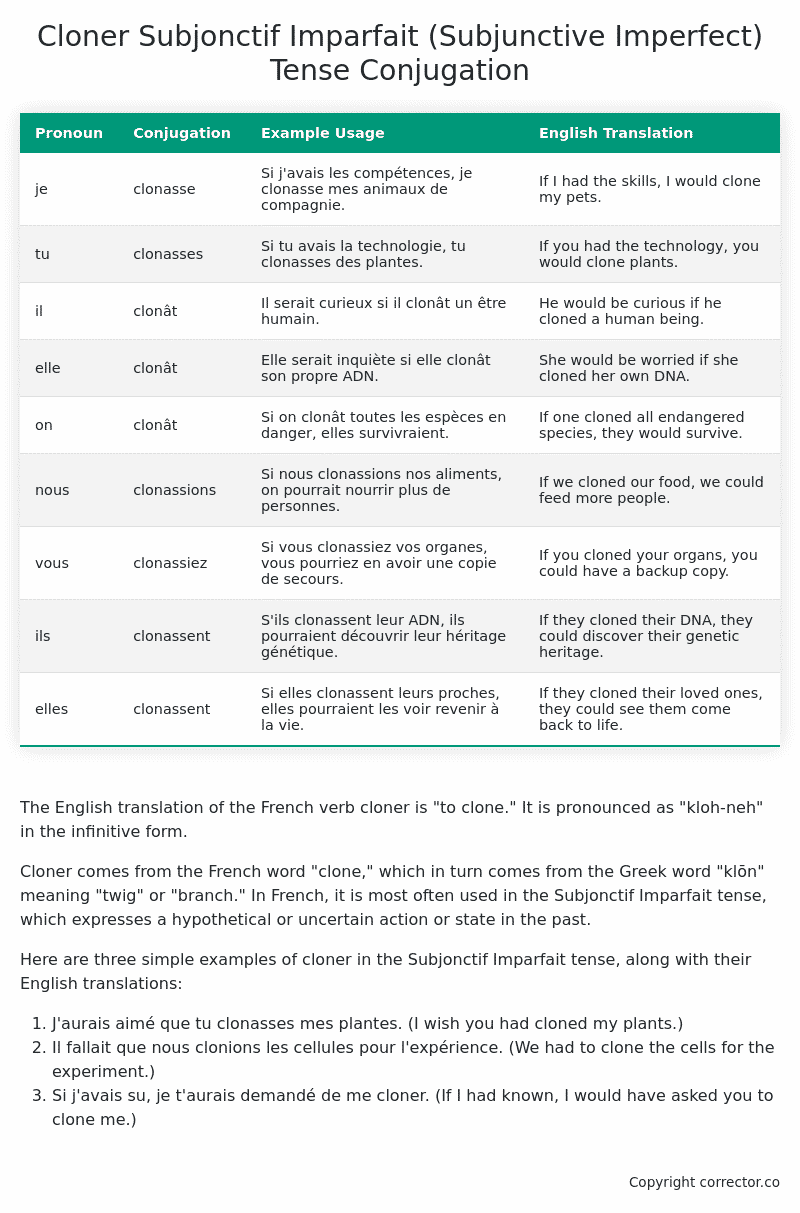Subjonctif Imparfait (Subjunctive Imperfect) Tense Conjugation of the French Verb cloner
Introduction to the verb cloner
The English translation of the French verb cloner is “to clone.” It is pronounced as “kloh-neh” in the infinitive form.
Cloner comes from the French word “clone,” which in turn comes from the Greek word “klōn” meaning “twig” or “branch.” In French, it is most often used in the Subjonctif Imparfait tense, which expresses a hypothetical or uncertain action or state in the past.
Here are three simple examples of cloner in the Subjonctif Imparfait tense, along with their English translations:
- J’aurais aimé que tu clonasses mes plantes. (I wish you had cloned my plants.)
- Il fallait que nous clonions les cellules pour l’expérience. (We had to clone the cells for the experiment.)
- Si j’avais su, je t’aurais demandé de me cloner. (If I had known, I would have asked you to clone me.)
Table of the Subjonctif Imparfait (Subjunctive Imperfect) Tense Conjugation of cloner
| Pronoun | Conjugation | Example Usage | English Translation |
|---|---|---|---|
| je | clonasse | Si j’avais les compétences, je clonasse mes animaux de compagnie. | If I had the skills, I would clone my pets. |
| tu | clonasses | Si tu avais la technologie, tu clonasses des plantes. | If you had the technology, you would clone plants. |
| il | clonât | Il serait curieux si il clonât un être humain. | He would be curious if he cloned a human being. |
| elle | clonât | Elle serait inquiète si elle clonât son propre ADN. | She would be worried if she cloned her own DNA. |
| on | clonât | Si on clonât toutes les espèces en danger, elles survivraient. | If one cloned all endangered species, they would survive. |
| nous | clonassions | Si nous clonassions nos aliments, on pourrait nourrir plus de personnes. | If we cloned our food, we could feed more people. |
| vous | clonassiez | Si vous clonassiez vos organes, vous pourriez en avoir une copie de secours. | If you cloned your organs, you could have a backup copy. |
| ils | clonassent | S’ils clonassent leur ADN, ils pourraient découvrir leur héritage génétique. | If they cloned their DNA, they could discover their genetic heritage. |
| elles | clonassent | Si elles clonassent leurs proches, elles pourraient les voir revenir à la vie. | If they cloned their loved ones, they could see them come back to life. |
Other Conjugations for Cloner.
Le Present (Present Tense) Conjugation of the French Verb cloner
Imparfait (Imperfect) Tense Conjugation of the French Verb cloner
Passé Simple (Simple Past) Tense Conjugation of the French Verb cloner
Passé Composé (Present Perfect) Tense Conjugation of the French Verb cloner
Futur Simple (Simple Future) Tense Conjugation of the French Verb cloner
Futur Proche (Near Future) Tense Conjugation of the French Verb cloner
Plus-que-parfait (Pluperfect) Tense Conjugation of the French Verb cloner
Passé Antérieur (Past Anterior) Tense Conjugation of the French Verb cloner
Futur Antérieur (Future Anterior) Tense Conjugation of the French Verb cloner
Subjonctif Présent (Subjunctive Present) Tense Conjugation of the French Verb cloner
Subjonctif Passé (Subjunctive Past) Tense Conjugation of the French Verb cloner
Subjonctif Imparfait (Subjunctive Imperfect) Tense Conjugation of the French Verb cloner (this article)
Subjonctif Plus-que-parfait (Subjunctive Pluperfect) Tense Conjugation of the French Verb cloner
Conditionnel Présent (Conditional Present) Tense Conjugation of the French Verb cloner
Conditionnel Passé (Conditional Past) Tense Conjugation of the French Verb cloner
L’impératif Présent (Imperative Present) Tense Conjugation of the French Verb cloner
L’infinitif Présent (Infinitive Present) Tense Conjugation of the French Verb cloner
Struggling with French verbs or the language in general? Why not use our free French Grammar Checker – no registration required!
Get a FREE Download Study Sheet of this Conjugation 🔥
Simply right click the image below, click “save image” and get your free reference for the cloner Subjonctif Imparfait tense conjugation!

Cloner – About the French Subjonctif Imparfait (Subjunctive Imperfect) Tense
Formation
Common Everyday Usage Patterns
Interactions with Other Tenses
Subjonctif Présent
Indicatif Passé Composé
Conditional
Conditional Perfect
Summary
I hope you enjoyed this article on the verb cloner. Still in a learning mood? Check out another TOTALLY random French verb conjugation!


